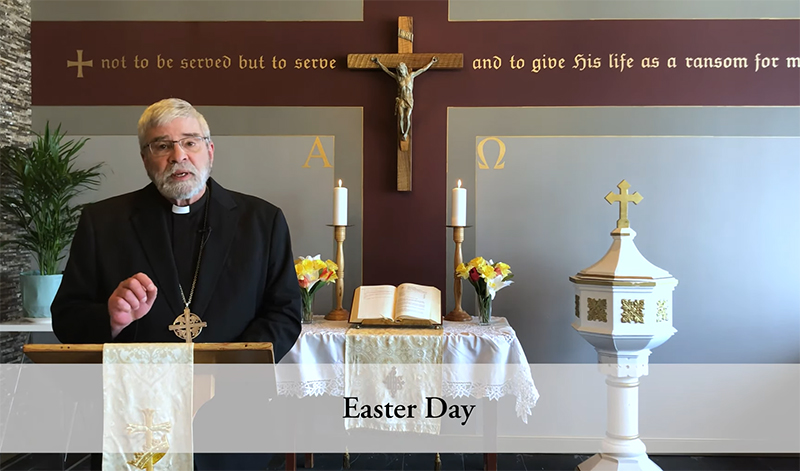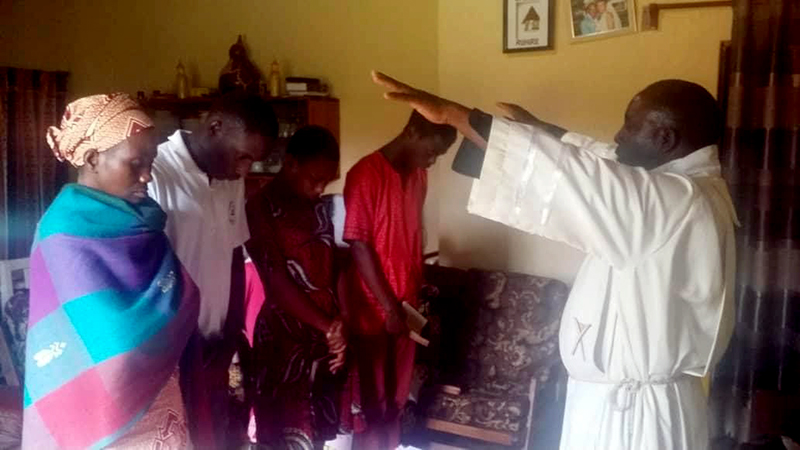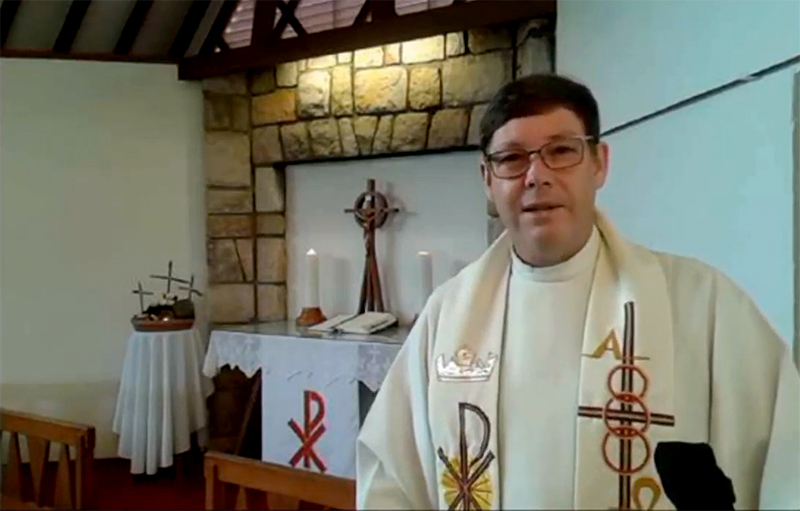
LCC President Timothy Teuscher brings Easter greetings online.
WORLD – As the world grapples with the COVID-19 pandemic, member churches of the International Lutheran Council continue to respond with practical and spiritual support. Today, we look at the response of ILC member churches in Canada, Rwanda, and South Africa.
Canada
Canada has reported 35,708 total cases of COVID-19, and 1,618 deaths. Different provinces have set different regulations to curb the spread of the disease, including required quarantine periods for those travelling out of province, closing national borders, and limiting the number of people allowed to gather in public. There is no deadline yet indicated for lifting of these measures.
Lutheran Church–Canada has been proactive in responding to the changing situation, providing guidance for members across the country. In a letter on March 19, LCC recommended all congregations temporarily suspend services and other group events for the time being. The letter highlights four of the Ten Commandments especially applicable to the current crisis: the Fourth, the Fifth, the Second, and the Third Commandments.
“The latter one was the primary challenge facing us,” notes LCC President Timothy Teuscher. It was important, he says, to assist churches in “providing new and various ways for our people to hear God’s Word and so receive the gifts of forgiveness, life, and salvation which Christ offers and bestows upon us apart from the normal and ordinary Divine Service.” Many congregations are now offering services, sermons, Bible Studies, and more online.
LCC has also gathered a number of resources for pastors and people on the synodical website, which continue to be augmented with new material. They include devotional and congregational resources developed by LCC, along with links to various resources made available by The Lutheran Church—Missouri Synod and Concordia Publishing House. Among other materials, LCC has also provided written sermons, and video services and devotions prepared by President Teuscher and LCC’s Mission Executive. These resources are intended to supplement material offered pastors to congregants on the local level.
Lutheran Church–Canada also revamped the latest issue of its national magazine, The Canadian Lutheran, to focus entirely on providing spiritual resources for church members during the COVID-19 pandemic. The issue includes devotional articles, a guide to home devotions, prayers, and links to more resources. Pastors have been encouraged to drop the magazine off at the homes of members, but you can also see the magazine for free online.
Meanwhile, LCC is continuing to find ways to serve its congregations. “Our administrator, office manager, and financial people continue to provide assistance to our congregations and pastors who are or may be experiencing financial hardships,” says President Teuscher. To that end, LCC has revamped its national website to accept online donations for individual congregations, and is providing up-to-date information from the government concerning its wage-subsidy program. Currently LCC continues to be financially able to meet its commitments for international and national missions.
President Teuscher notes that he continues to meet via conference call weekly with the Vice-President, Regional Pastors, the Communications Director, and Executive Staff “to receive updates, information, and above all to pray for and with one another in these uncertain and difficult times.” In particular, he points to this prayerful hymn composed by Martin Rinckart, who served during the famine and epidemic that broke out during the Thirty Years’ War and who wrote these words following the death of his wife:
Now thank we all our God With hearts and hands and voices,
Who wondrous things has done, In whom His world rejoices;
Who from our mothers’ arms Has blest us on our way
With countless gifts of love And still is ours today.
Oh, may this bounteous God Through all our life be near us,
With ever joyful hearts And blessed peace to cheer us
And keep us in His grace And guide us when perplexed
And free us from all ills In this world and the next! – LSB 895:1-2
Rwanda
The country of Rwanda has reported 147 total cases of COVID-19, with no deaths so far. Residents are not allowed to travel between cities, and all but essential workers are required to stay home, except for necessary movements like purchasing food or medicine. These measures have been extended at least until the end of April.

The local LMA-STH pastor in Sovu, Rwanda holds a small Easter celebration in his home.
The Lutheran Mission in Africa–Synod of a Thousand Hills (LMA-STH) is facing severe difficulties as a result of the crisis. The church body is small and very young; its ability to operate is dependent on regular offerings. As people cannot gather in churches at this time, there are no offerings. What is more, many members of the church are poor and are facing economic suffering as a result of work closures. “We have nothing with which to support them,” laments Bishop Selestine Seburikoko.
Pastors are still able to provide limited services to some members, including Bible Studies, but very few are now able to offer Holy Communion. They share messages of hope through phone calls to those members who have phones. They also offer, as they are able, limited sanitary support and food to neighbouring homes.
“Our confident hope is in God, who raised our Lord Jesus Christ from the dead,” says Bishop Seburikoko. He offers us the following passage from Romans 8:28 for our comfort and consolation: “And we know that for those who love God all things work together for good, for those who are called according to His purpose.”
South Africa (FELSISA)
At present, the nation of South Africa has reported 3,158 cases of COVID-19. A total of 54 people have died so far. A nationwide lockdown continues in effect at least until the end of April.

Rev. Kurt Schnackenberg, a FELSISA pastor serving St. John’s Lutheran Parish in Shelly Beach, South Africa, preaches online for Easter Sunday.
The lockdown has had a major impact on the Free Evangelical Lutheran Synod in South Africa (FELSISA). “With all gatherings being banned, no church services could be held in a period that included Holy Week, culminating in the Easter celebrations,” notes FELSISA Bishop Deiter Reinstorf. “Realizing that the temporary measures introduced by the president had the sole purpose of stemming the tide of the virus, and was not directed against the church, FELSISA’s leadership suspended all services.”
In the absence of regular services, the pastors of FELSISA have responded by using online media to reach members of their congregations: through livestreamed services and sermons; through video recordings; and through WhapsApp audio recordings. “The joyful realization soon dawned that this was a divine opportunity to reach far more people than before,” says Bishop Reinstorf. “Recordings are being forwarded to friends and family members who do not always gather in church, and we hope that the comforting message of the Gospel might lead to greater church attendance after the lockdown.”
Economic challenges arising from the lockdown threaten both individual members and smaller churches. “Despite the call to show generosity in difficult times and to continue with joyful thanksgiving by electronic fund transfers, the continued existence of some smaller congregations is threatened, as the future—in particular for small business owners—is bleak,” notes Bishop Reinstorf. In order to assist poorer communities, the FELSISA has introduced a “Solidarity Fund” in support of struggling congregations.
“This is a time to have faith, and for the Church of Christ to be a light to the world,” encourages Bishop Reinstorf. “This can only happen through the Word of God and His Spirit. We therefore humble ourselves before God, acknowledge our dependency on Him, call for mercy, rejoice in our salvation in Jesus Christ, and pray that God may use even the COVID-19 pandemic to our benefit to the salvation of mankind.”
———————
For more news and information from the International Lutheran Council about the COVID-19 pandemic, click here.
